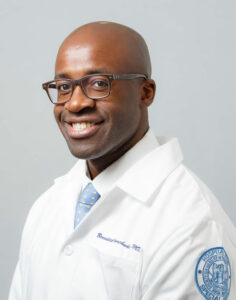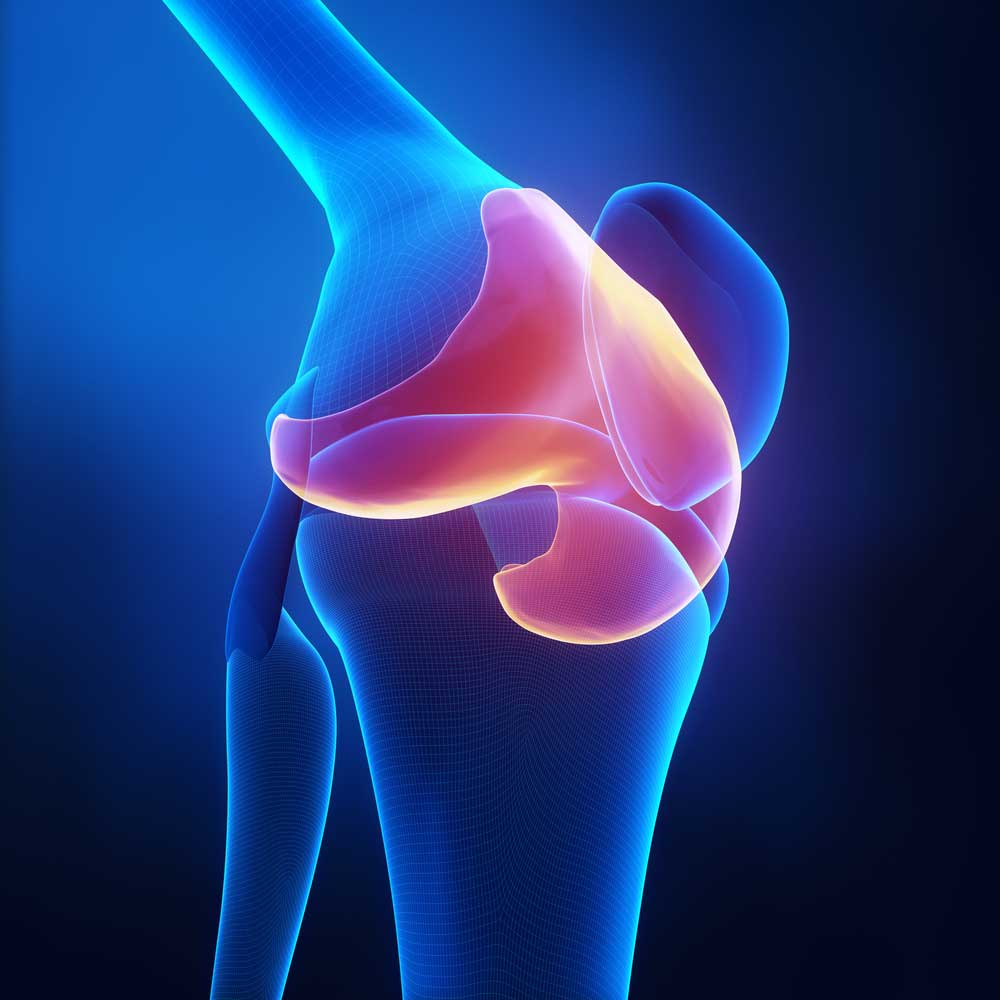Knee Cartilage Injury Specialist

Are you an athlete who participates in contact sports? If so, you may be at risk of sustaining a knee cartilage injury. Cartilage injuries are often caused by trauma, contact sports, repetitive weight bearing, and age related degeneration. Knee cartilage injury specialist, Doctor Benedict Nwachukwu provides diagnosis as well as surgical and nonsurgical treatment options for patients in Manhattan, New York City, NY who have sustained a knee cartilage injury. Contact Dr. Nwachukwu’s team today!
What are cartilage injuries of the knee?
Cartilage is found throughout the human body and acts as a cushion between the bones of joints. Healthy cartilage allows the bones to move and glide over each other without pain and with minimal friction. In the knee there are two types of cartilage: the articular cartilage covers the undersurface of the bones, and the meniscus (fibrocartilage) sits between the bones and acts as a shock absorber for the knee joint. Cartilage is generally tough but can be damaged or degenerated. If this occurs, the knee joint can be painful and will affect mobility. Dr. Benedict Nwachukwu is an orthopedic knee specialist who has extensive experience in treating cartilage injuries of the knee. Patients in Manhattan, New York City and the surrounding New York boroughs count on him for the best cartilage injury treatment.

What causes a cartilage injury in the knee?
Knee cartilage injuries can occur in a number of different ways; either from a long process of wear and tear, or a sudden injury, trauma or accident. Some causes of knee cartilage injuries are:
- Wear and tear: Common in older individuals, wear and tear cartilage injuries occur over time from use or over-use.
- Joint Dislocation: The cartilage tissue can be damaged if the joint is forced out of its normal position
- Meniscal Tear: Any injury, usually a forceful twist of the knee can tear the knee cartilage.
- Infection: Inflammation of the joint, caused by a condition called septic arthritis can cause cartilage damage.
- Accident: A fall, blow to the knee or other accident can tear or injure the cartilage.
- Inflammation: Most forms of arthritis include painful swelling of the joint which can affect the health of the cartilage.
Are there different types of cartilage injuries?
Since there are different types of cartilage in the knee, there are different injuries that can occur. Dr. Nwachukwu specializes in treating the following cartilage injuries:
- Articular Cartilage Injury: The smooth, slippery covering at the end of the bones that allows for a painless and frictionless glide of one bone against another. It also acts as a shock absorber.
- Meniscus tear or Injury: The two c-shaped pieces of fibrocartilage in the knee that sits between the femur (leg bone) and tibia (shin bone). The meniscus acts as a shock absorber and is responsible for bearing weight or “load” across its surface.
What are the symptoms of cartilage injury in the knee?
Cartilage injuries of the knee, regardless of the type of cartilage involved have similar symptoms:
- Pain: Often sharp and intense at the time of injury. Degenerative conditions are marked by a slower onset of pain and usually a dull ache.
- Swelling: Especially after activity.
- Catching in the knee that may be caused by loose bodies or torn pieces of cartilage or bone that do not allow the knee to function properly.
- Decrease in range of motion
- Inability to walk or stand normally
How are cartilage injuries of the knee diagnosed?
Dr. Nwachukwu will obtain a thorough medical history and background, along with a physical examination of the knee. If a cartilage injury is suspected, he will request an MRI to see the soft tissues in the joint and x-rays if he suspects bone involvement.
What are the treatment options for cartilage injuries of the knee?
Non-surgical Treatments:
The type, location and severity of cartilage damage will help determine the best treatment options for patients in New York. Many patients respond well to a non-surgical approach. Treatment may include:
- RICE: Rest, Ice, Compression, Elevation
- NSAIDs: Non-steroidal anti-inflammatory drugs
- Bracing: To support the knee
- Non-weight bearing for a time: keeps pressure off of the damaged cartilage
- Biologics: may help alleviate symptoms and in some cases, help heal cartilage tissue.
- Physical Therapy: Strengthens supporting muscles to regain mobility and range of motion.
Surgical Treatments:
It’s important to remember that cartilage does not have its own blood supply, so it does not have the ability to heal itself after a tear or injury. If left untreated, a cartilage injury of the knee can cause joint deterioration, leading to degenerative disorders like osteoarthritis.
The type of cartilage repair Dr. Nwachukwu will use is based on several factors including the patient’s age, activity level, type of tear and size of lesion. Surgical treatments may include:
- Debridement: Can be done arthroscopically, this procedure shaves the damaged cartilage, creating a smooth surface. Loose bodies are removed to prevent irritation.
- Microfracture: This procedure treats areas of damaged articular cartilage in the knee. Small holes are made in the bone causing it to bleed. The blood stimulates new cartilage formation.
- BMAC: Biologics in conjunction with cartilage repair. Uses the body’s own bone marrow to heal and recreate new cartilage.
For more information on cartilage injuries of the knee and the treatment options available for your knee pain, please contact the office of Benedict Nwachukwu, MD, orthopedic knee specialist serving Manhattan, New York City and the surrounding New York boroughs.





